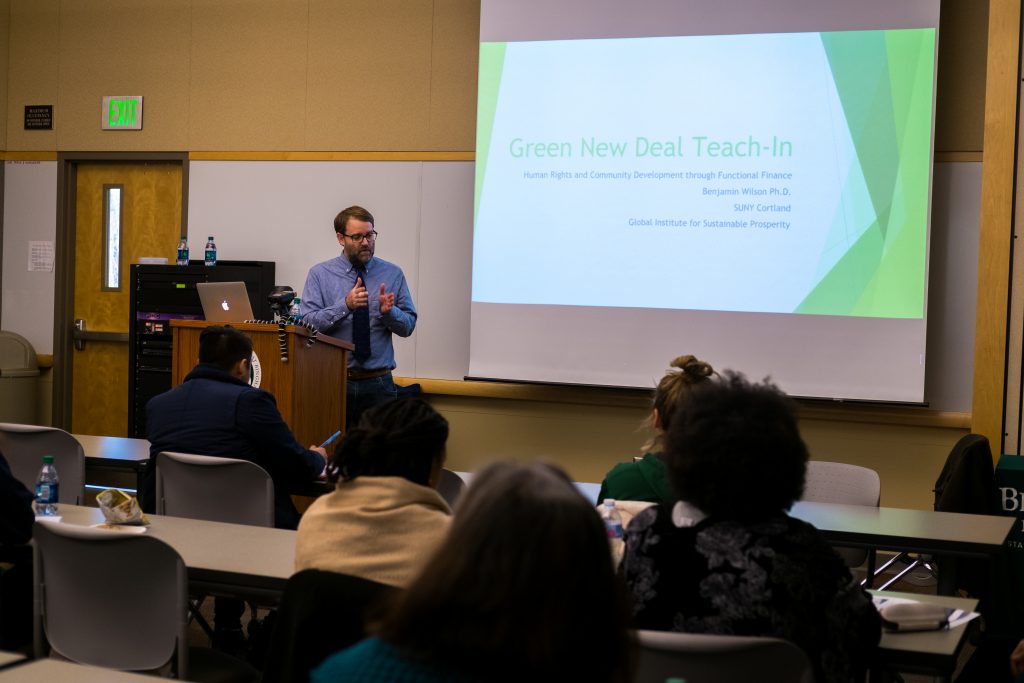
Benjamin Wilson wants to make the “Green New Deal” happen.
Wilson, an assistant professor of economics at SUNY Cortland, came to Binghamton University’s Downtown Center on Thursday to discuss the realities and myths surrounding the recently announced Green New Deal (GND), a sweeping proposal to overhaul energy infrastructure nationwide. The proposal, introduced by Sen. Ed Markey (D-MA) and Rep. Alexandria Ocasio-Cortez (D-NY), commits to investing in clean energy jobs and infrastructure in an effort to stave off climate change, create jobs and improve quality of life for the middle and working classes.
At the teach-in, sponsored by the University’s Human Rights Institute, Wilson discussed the arguments for the GND and expressed optimism about the plan, which he said could reinvigorate the nation.
“I think that we’ve seen the ugliest that America can be in the last couple years, and I think that people want something different,” Wilson said.
But Wilson said the most crucial aspect of implementing climate change reform is a solid understanding of public finance. According to Wilson, responsible climate change reform has been halted in government by a series of myths, including the idea that the government should always work to balance its budget, that increasing the rate of taxation is always discouraged and that the program will be more costly than the consequences of climate change.
“We’re pretending that we’re budget-constrained, but it is a question of determining what we want to prioritize and our value system,” Wilson said. “How are we going to use money as a tool to achieve our objectives instead of making money the objective?”
As an economist, Wilson aimed to dismiss these misconceptions during the teach-in. He described the deal as a restructuring of economic activity, production, consumption and distribution to better meet the real constraints of both the people and the planet, stating that climate change and a faulty economic system are inextricably linked. He also said students needed to acquire a sound knowledge of economic and monetary systems to understand the GND, which has been derided for its socialist nature and faced resistance among some members of Congress with ties to the fossil fuel industry.
“An objective is to get the word out and to sort through mythology surrounding GND and through [beliefs] like, ‘We’re going to take away your airplanes and your cars,’” Wilson said.
The organizer of the teach-in, Jakob Feinig, an assistant professor of human development at BU, said he believed the discussion was important to boost students’ agency when discussing the intersection of climate change and economics.
“I think we’re in a critical moment where the deal is emerging as a real possibility, and it’s pretty important that students know about it to be able to participate,” Feinig said.
Kailey Williams, a sophomore majoring in psychology, said she attended the teach-in to inform herself.
“I wanted to learn more about it — I’ve heard the term thrown around a lot recently and I just wanted to hear about it more,” Williams said. “I really enjoyed the historical background and learning more about structural injustices, and how the GND would try to have the same economic benefits but actually make it applicable for people.”
Wilson said he believes the GND could be an opportunity for America to begin addressing the 21st century’s most pressing issues.
“It’s time for America to start dreaming big again,” Wilson said. “We want to solve the biggest problems. Putting people on the moon was great, but ending poverty and reversing climate change would be infinitely larger accomplishments.”


